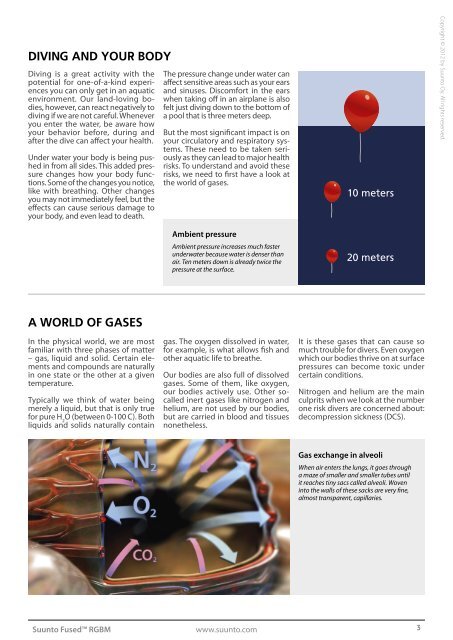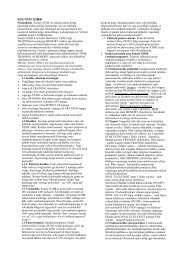THE PATH TO FUSED <strong>RGBM</strong>At the heart of every <strong>Suunto</strong> dive computeris an algorithm that calculatesdecompression for a dive, called the reducedgradient bubble model (<strong>RGBM</strong>).Relentlessly pursuing ever safer modelsfor divers of all types, <strong>Suunto</strong> continuesto push for <strong>RGBM</strong> perfection. A storiedhistory full of science, development,and underwater experience lies withinevery <strong>Suunto</strong> dive computer.This document explains detailes of ouralgorithm, and how the new <strong>Suunto</strong>Fused TM <strong>RGBM</strong> has been developed.<strong>Suunto</strong>'s work on decompressionmodels for dive computers spans overthree decades. A pioneer in the field,<strong>Suunto</strong>’s modelling has adopted thelatest scientific know-how and theoriesfrom leading experts.<strong>Suunto</strong>’s first dive computer was the<strong>Suunto</strong> SME ML (1987). Given thetechnology available at the time, itwas essentially an electronic dive table.This was obviously not adequate,and soon <strong>Suunto</strong>’s Ari Nikkola implementedthe Buhlman model for<strong>Suunto</strong> dive computers.Over the next decade, the algorithmwas further improved to increasediver safety. These include, forexample, voluntary safety stops, asymmetricon and off-gassing, as well asmodifications based on the work ofDr. Merrill P. Spencer.During this time, the dive communitywas still seeing too many accidents.To address these problems, <strong>Suunto</strong>launched the <strong>Suunto</strong> Vyper in 1999which featured the new <strong>Suunto</strong> ReducedGradient Bubble Model (<strong>RGBM</strong>).The <strong>Suunto</strong> <strong>RGBM</strong> was developed inco-operation with Dr. Bruce Wienke.The new algorithm could account fordiver behaviors which increase healthrisks. These behaviors include multidaydiving, reverse dive profiles and shortsurface intervals.When deep stops (Pyle stops) becamea proven beneficial method for decompression,they were added to the<strong>Suunto</strong> D9 and Vytec DS (2004) as avoluntary notification.With the launch of the <strong>Suunto</strong> HelO 2in 2009, <strong>Suunto</strong> introduced a newdecompression model, the <strong>Suunto</strong>Technical <strong>RGBM</strong>, also developed withDr. Wienke. This algorithm included allprevious implementations and addednew features for handling helium gas.Since the late 1980s, Dr. Wienke hadbeen working at the Los AlamosNuclear Laboratory on the so-called‘full’ <strong>RGBM</strong>. This development was targetingthe needs of deep divers andmilitary personnel carrying out difficultdives.The new <strong>Suunto</strong> Fused <strong>RGBM</strong> combinesthe benefits of <strong>Suunto</strong>’s Technical<strong>RGBM</strong> and the ‘full’ <strong>RGBM</strong>, bringingthe benefits of both to recreationaldivers and technical divers.None of this development would havebeen possible without the pioneeringwork of Dr. Wienke. Despite the rangeof dive computers offered by <strong>Suunto</strong>for most any type of diver, he hasplayed a vital role in the practical implementationof his theories.Copyright © 2012 by <strong>Suunto</strong> Oy. All rights reserved.1987<strong>Suunto</strong>’s first dive computer<strong>Suunto</strong> SME MLImplementation ofBuhlman model1999<strong>Suunto</strong> Vyper<strong>Suunto</strong> Redudec GradientBubble Model (<strong>RGBM</strong>)Developed withDr. Bruce Wienke2009<strong>Suunto</strong> HelO 2Technical <strong>RGBM</strong>Developed withDr. Bruce Wienke1990’sAlgorithm improvement: Voluntarysafety stops, asymmetric on andoff-gassingDr. Merrill P. Spencer2004<strong>Suunto</strong> D9Vytec DS2012<strong>Suunto</strong> Fused <strong>RGBM</strong>Developed withDr. Bruce Wienke<strong>Suunto</strong> has been working together with Dr. Bruce Wienke for well over a decade.Dr. Wienke is a Program Manager in the Nuclear Weapons Technology Simulation And Computing Office at the LosAlamos National Laboratory (LANL), with interests in computational decompression and models, gas transport, andphase mechanics. He is the developer of the Reduced Gradient Bubble Model (<strong>RGBM</strong>), a dual phase approach tostaging diver ascents over an extended range of diving applications (altitude, nonstop, decompression, multiday,repetitive, multilevel, mixed gas, and saturation)."<strong>RGBM</strong> is the most realistic model in science. The parameters are correlatedwith real data of thousands of dives which makes it good physics, and the datais validated and correlated. I have been working with <strong>Suunto</strong> since the 90’sand <strong>Suunto</strong>’s progression from <strong>Suunto</strong> <strong>RGBM</strong> to Technical <strong>RGBM</strong> and now to<strong>Suunto</strong> Fused <strong>RGBM</strong> is a very natural one. The new algorithmis a supermodel that covers all types of diving."- Dr. Bruce Wienke<strong>Suunto</strong> Fused <strong>RGBM</strong> www.suunto.com 2
DIvING AND YOUR BODYDiving is a great activity with thepotential for one-of-a-kind experiencesyou can only get in an aquaticenvironment. Our land-loving bodies,however, can react negatively todiving if we are not careful. Wheneveryou enter the water, be aware howyour behavior before, during andafter the dive can affect your health.Under water your body is being pushedin from all sides. This added pressurechanges how your body functions.Some of the changes you notice,like with breathing. Other changesyou may not immediately feel, but theeffects can cause serious damage toyour body, and even lead to death.The pressure change under water canaffect sensitive areas such as your earsand sinuses. Discomfort in the earswhen taking off in an airplane is alsofelt just diving down to the bottom ofa pool that is three meters deep.But the most significant impact is onyour circulatory and respiratory systems.These need to be taken seriouslyas they can lead to major healthrisks. To understand and avoid theserisks, we need to first have a look atthe world of gases.10 metersCopyright © 2012 by <strong>Suunto</strong> Oy. All rights reserved.Ambient pressureAmbient pressure increases much fasterunderwater because water is denser thanair. Ten meters down is already twice thepressure at the surface.20 metersA WORLD OF GASESIn the physical world, we are mostfamiliar with three phases of matter– gas, liquid and solid. Certain elementsand compounds are naturallyin one state or the other at a giventemperature.Typically we think of water beingmerely a liquid, but that is only truefor pure H 2O (between 0-100 C). Bothliquids and solids naturally containgas. The oxygen dissolved in water,for example, is what allows fish andother aquatic life to breathe.Our bodies are also full of dissolvedgases. Some of them, like oxygen,our bodies actively use. Other socalledinert gases like nitrogen andhelium, are not used by our bodies,but are carried in blood and tissuesnonetheless.It is these gases that can cause somuch trouble for divers. Even oxygenwhich our bodies thrive on at surfacepressures can become toxic undercertain conditions.Nitrogen and helium are the mainculprits when we look at the numberone risk divers are concerned about:decompression sickness (DCS).Gas exchange in alveoliWhen air enters the lungs, it goes througha maze of smaller and smaller tubes untilit reaches tiny sacs called alveoli. Woveninto the walls of these sacks are very fine,almost transparent, capillaries.<strong>Suunto</strong> Fused <strong>RGBM</strong> www.suunto.com 3
















